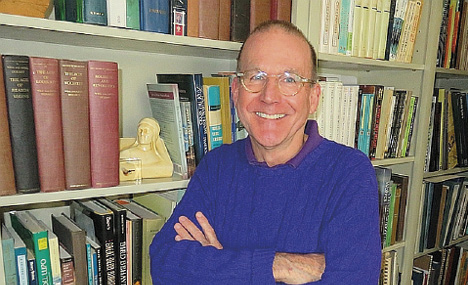Thomas McNamee – 50th Reunion Essay
Thomas McNamee
 2383 Bush St.
2383 Bush St.
San Francisco, CA 94115
t_mc@comcast.net
415-722-4479
Spouse(s): Louise Rossett McNamee, (1970–1993); Elizabeth Yates McNamee (1996– )
Education: Yale B.A. 1969
Career: CBS Records, talent scout, record producer, advertising writer, 1969-1976; independent writer, 1976–present
Activities & Honors: Greater Yellowstone Coalition, Board of Directors (1986–1992) & Chairman (1987–1990); RARE, Board (1998-2004); Lava Lake Science and Conservation Advisory Board (2005–2010); Center for Education about Sustainable Agriculture, Board (2006–2009)
Interests: nature conservation, particularly Greater Yellowstone Ecosystem; population growth; global ecosystem; cooking; food systems; organic agriculture; fishing; hiking; botanizing; art—particularly Renaissance painting
College: Silliman
Two eras of 25 years each cleave my life in twain: two marriages; East and West; certitude and uncertainty. My personal essay for the 1994 class book ended with divorce and a move from New York to Montana. My wife had insisted on one last ride on my horse—against all advice, for he was squirrelly at best—and he had bolted out from under her, leaving her with a shattered leg. Following advice I didn’t want to take, I sold him down the road. My mother died. Whatever bravado I had managed to maintain crumbled.
Time for a new life! Well, and a life to continue, for heaven’s sake. My father was going strong, and we grew closer. I no longer served on the board of the Greater Yellowstone Coalition, but I was deeply invested in the reintroduction of the gray wolf, the biggest thing to happen to that ecosystem since the founding of the world’s first national park. It happened that an attractive representative of the Sierra Club Legal Defense Fund showed up at one of the Coalition’s annual meetings, trying to poach our donors. Long story short, Elizabeth Yates was soon visiting the ranch, and her visits got longer and longer till at some point that I can’t quite put my finger on now, Elizabeth had a Montana driver’s license and I was enjoying the balmy winter weather wafting in through the Golden Gate. She learned what it was like to dig an SUV out of a snowdrift at 30 degrees below zero, and I learned how to parallel park on a 30-degree slope. In 1996 we were married—in New York, still in my heart my home—and in 1997 The Return of the Wolf to Yellowstone was published.
I sold my ranch partnership and bought a house in San Francisco, but I stayed embedded in the wild—spending as much as possible of every summer in Montana, hiking up and down the Apennines, advising on the ecological restoration of a million-acre ranch in Idaho. On the board of an international conservation group called RARE, I discovered that there is more biodiversity on the world’s farms than in all its nature reserves, and since I’d been writing about food from time to time anyhow, that led me, circuitously, to Alice Waters and Chez Panisse: The Romantic, Impractical, Often Eccentric, Ultimately Brilliant Making of a Food Revolution. Food and my Mississippi Delta heritage opened the way to The Man Who Changed the Way We Eat: Craig Claiborne and the American Food Renaissance. I had always loved the visual arts, so when the chance came along to write a documentary about the sculptor Alexander Calder, I jumped at it, and we won an Emmy and a Peabody. Along the way, magazines, op-eds, The New York Times Book Review. Most recently, back to critters, I published The Inner Life of Cats: The Science and Secrets of Our Mysterious Feline Companions.
Work—fine, as far as it goes, but underlain by uncertainty, and fragmentary. What has kept my last 25 years whole, what makes it, as I look back over it, as an era, whole, are friends and love. (I never had children.) My father and I found love in his last years that had eluded us for decades. He made it to 95. I learned from him, from Elizabeth, and from my friends to treasure companionship, conversation, trust, the certainty that you can count on someone. Hadn’t I always known these things? Yes, but I hadn’t adequately recognized them. Was there a thread of Yale, Yale’s ethos, running through them—through friendship and trust—even if only beyond my awareness? I think so.

If the above is blank, no 50th reunion essay was submitted.
